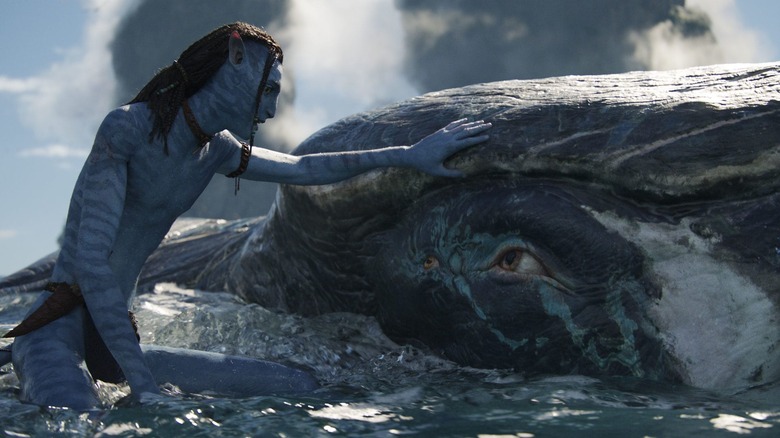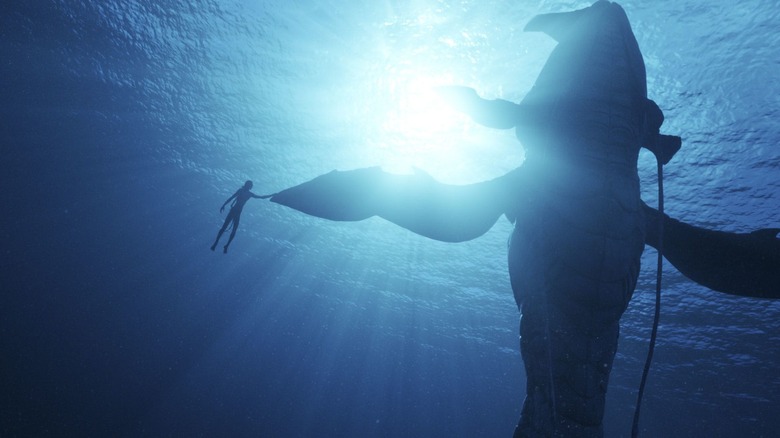Avatar: The Way Of Water's Bountiful Planet Pandora Plays On Our Climate Anxieties
This article contains spoilers for "Avatar: The Way of Water."
In 2009, James Cameron's "Avatar" arrived in theaters and went on to become the highest-grossing film of all time. Boasting boundary-pushing special effects that redefined 3D technology, the sci-fi epic was set up to succeed from the get-go. However, the film also arrived toward the end of the United Nations Climate Change Conference, when public debate about the environment was at an all-time high.
In addition to being an entertaining sci-fi action spectacle, the first "Avatar" is a social commentary on the plight of the world's rainforests at the hands of greedy humans. The story revolves around a tribe of aliens from the planet Pandora, who must protect their forests from colonialists who want to exploit their home world for its natural resources. Releasing the movie when discourse surrounding similar topics was in the air certainly helped "Avatar" resonate with viewers across the globe.
The sequel, "Avatar: The Way of Water," was a long time in the making. Once again, Cameron and his team have treated viewers to a visually stunning feast that showcases more groundbreaking cinematic technology. Still, the environmentally conscious heart that beats throughout the first "Avatar" remains intact. For this outing, Cameron and the gang still have the climate on their mind, but the commentary extends far beyond the rainforests this time around.
Avatar: The Way of Water focuses on climate change and the destruction of the planet
In the years that have passed since the release of the first "Avatar," climate change and other environmental issues have become more prominent. "Avatar: The Way of Water" explores several themes, ranging from militaristic aggression to colonialism to the refugee crisis to accepting others. However, the movie really hammers home the notion that human beings are destroying the planet — especially the oceans.
James Cameron has been trying to warn people about these issues for years. Per Buzzfeed, he previously noted that climate change is affecting the world's waters, and human behavior is only making it worse. "The ocean has become the toilet of human civilization," he bluntly told reporters in 2018. Watching "Avatar: The Way of Water," it's evident that he still feels this way.
When Colonel Quaritch (Stephen Lang) and his cohorts enter Metkayina waters, they proceed to launch bombs and rockets into the ocean without a second thought. In fact, some of the human characters seem to enjoy causing destruction to the natural environment, which is made all the more disturbing by the scenes depicting the slaughter of sea creatures. The film argues that the oceans are being destroyed, and the people responsible couldn't care less about the damage they're causing.
James Cameron hopes that Avatar: The Way of Water informs people about the bigger issues
"Avatar: The Way of Water" depicts the oceans as beautiful and splendorous — at least until the humans arrive and start blowing things up. When Colonel Quaritch and his goons hit the scene, the peaceful oceans are disrupted with aggressive machinery and weapons. The tranquil blues are subsequently replaced with black smoke and flames, and the intelligent creatures that roam the oceans become war statistics.
According to Cameron, he wanted to explore the wonders of the ocean and all of its beauty, while simultaneously highlighting all of the damage that's been inflicted on it thanks to wreckless human behavior. "We live in a shifting baseline, where the ocean as we see it today is not what it once was," Cameron told National Geographic. "The film was also an opportunity to show us what our oceans might have looked like 300, 400, 500 years ago, before we really got busy toward an industrial civilization."
Cameron hopes that people who see the movie will be more aware of the damage being inflicted on the oceans moving forward. In the aforementioned National Geographic interview, he said that he wants the film to "reconnect [people] with what we are presently losing here on this planet."
Avatar the Way of Water highlights the importance of preserving the oceans
While James Cameron's previous comments come across as a hopeful wakeup call, he fears the worst. The director revealed that while "Avatar: The Way of Water" aims to inspire change, time is running out.
While speaking to National Geographic, he compared the current state of the oceans to "fourth-stage cancer" and claimed that "coral reefs will be a thing that exists only in films in 50 to 75 years, in most places around the planet." The director went on to say that his grandchildren won't be able to explore the oceans unless some widespread change is enacted, but that won't happen until people learn to love the planet again.
As a filmmaker, Cameron's duty is to entertain, first and foremost. "Avatar: The Way of Water" isn't a three-and-a-half-hour polemic on real-life ills pertaining to the planet, but it does get its point across. Every shot of a dead tulkun is a reminder that real-world hunting, pollution, and sea-based militaristic experiment is killing nature. When the film's human hunters extract the anti-aging substance from the tulkun, it illustrates people's real-life willingness to destroy nature for wealth and material gain. The movie will undoubtedly make some serious bank at the box office, but its message will hopefully resonate with people in the same way that the first film did.



